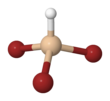Tribromosilane
Appearance

| |||
| |||
| Names | |||
|---|---|---|---|
| IUPAC name
Tribromosilane
| |||
| Other names
Silicobromoform; Tribromomonosilane
| |||
| Identifiers | |||
3D model (JSmol)
|
|||
| ChemSpider | |||
| ECHA InfoCard | 100.029.250 | ||
PubChem CID
|
|||
| UNII | |||
CompTox Dashboard (EPA)
|
|||
| |||
| |||
| Properties | |||
| Br3HSi | |||
| Molar mass | 268.805 g·mol−1 | ||
Except where otherwise noted, data are given for materials in their standard state (at 25 °C [77 °F], 100 kPa).
| |||
Tribromosilane is the chemical compound with the formula Br3Si.[1] At high temperatures, it decomposes to produce silicon, and is an alternative to purified trichlorosilane of ultrapure silicon in the semiconductor industry.
The Schumacher Process of silicon deposition uses tribromosilane gas to produce polysilicon, but it has a number of cost and safety advantages over the Siemens Process to make polysilicon.[2]
It may be prepared by heating crystalline silicon with gaseous hydrogen bromide at high temperature.[3] It spontaneously combusts when exposed to air.[4]
References
- ^ PubChem. "Tribromosilane". pubchem.ncbi.nlm.nih.gov. Retrieved 2022-12-22.
- ^ The Schumacher Process
- ^ Schumb WC, Young RC (April 1930). "A study of the reaction of hydrogen bromide with silicon". Journal of the American Chemical Society. 52 (4): 1464–1469. doi:10.1021/ja01367a025.
- ^ Schumb WC (December 1942). "The Halides and Oxyhalides of Silicon". Chemical Reviews. 31 (3): 587–595. doi:10.1021/cr60100a004.


